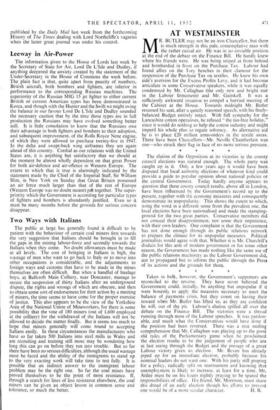AT WESTMINSTER
MR. BUTLER may not be an iron Chancellor, but there is much strength in this pale, contemplative man with the rather casual air. He was in no enviable position at the end of the debate on the Finance Bill. He hardly knew where his friends were. He was being sniped at from behind and bombarded in front on the Purchase Tax. Labour had found allies on the Tory benches in their clamour for the suspension of the Purchase Tax on textiles. He knew his own side's aversion for the Excess Profits Levy, and it had become articulate in some Conservative speakers, while it was equally condemned by Mr. Callaghan (the only new and bright star in the Labour firmament) and Mr. Gaitskell. It was a sufficiently awkward situation to compel a hurried meeting of the Cabinet at the House. Towards midnight Mr. Butler resumed his seat, after a quietly reasoned speech, with his finely- balanced Budget entirely intact. With full sympathy for the Lancashire cotton operatives, he refused "the tax-free holiday," since it would do nothing to help the cotton industry and might imperil his whole plan to regain solvency. As alternative aid he is to place £20 million arms-orders in the textile areas. There have been Chancellors—Mr. Neville Chamberlain was one—who struck their flag in face of no more serious pressure.
* * * * The elation of the Opposition at its victories in the county council elections was natural enough. The whole party was caught up in it. Only a few years ago it would have been disputed that local authority elections of whatever kind could provide a guide to popular opinion about national policies or the central Government. Today hardly anyone appears to question that these county council results, above all in London, have been influenced by the Government's record up to the present, together with the economy measures and consequently demonstrate its unpopularity. This shows the extent to which, using the word in a different sense from the prevalent one, the local elections have been nationalised and made the stamping- ground for the two great parties. Conservative members did not conceal their disappointment, nor some their impatience, with their own leaders. One complaint is that the Government has not done enough through its public relations network to prepare the climate for its unpopular measures. Political journalists would agree with that. Whether it is Mr. Churchill's disdain for this arm of modern government or for some other reason, the Government has made nothing like the same use of the public relations machinery as the Labour Government did, not to propagand but to inform the public through the Press of its actions and the grounds for them.
* * * * Taken in bulk, however, the Government's supporters are reconciled to the reverse. They have never believed the Government could, initially, be anything but unpopular if it were honestly to apply the measures necessary to meet the balance of payments crisis, but they count on having their reward when Mr. Butler has lifted us, as they are confident he will, out of the pit. Labour's elation spilled all over the debate on the Finance Bill. The victories were a thread running through most of the Labour speeches. It was pardon- able, and much what the Conservatives would have done if the position had been reversed. There was a nice smiling comprehension that Mr. Callaghan was playing up to the good old rules of the Parliamentary game when he proclaimed the election results to be the judgement of people who are at last seeing through the Budget and the presage of a great Labour victory given an election. Mr. Bevan has already piped up for an immediate election, probably because his nominal leaders do not want one. With his party still groping for a policy, radically split on rearmament and knowing that unemployment is likely to increase, at least for a time, Mr. Attlee must be on his knees nightly praying to be spared the responsibilities of office. His friend, Mr. Morrison, must share this dread of an early election though his efforts to prevent one would be of a more secular character. H. B.


































 Previous page
Previous page